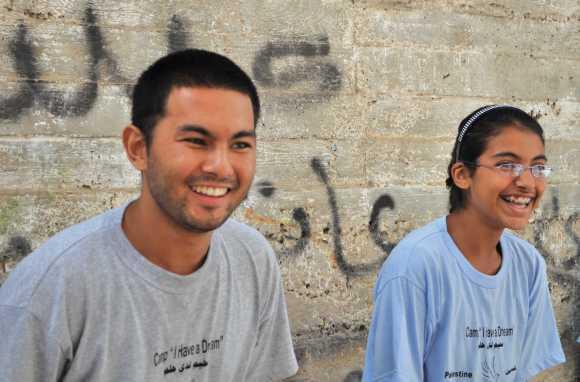 | « Back to article | Print this article |
Waking up everybody, from Palestine to America
In the second part of the series on Indian-Americans who won the Paul and Daisy Soros Fellowships for New Americans, Arthur J Pais profiles Indra Sen, who through his own programme is waking up Americans to the plight of Palestinian children in refugee camps.
In the first part, Arthur had profiled Sahil Singh Gujral, who despite suffering from diabetes and displacement as a result of his parents' long-drawn divorce proceedings, managed to win the Fellowship.
At the 2007 convocation events at Georgetown University in Washington, DC, Indra Sen, a basketball star, a star student and a rap artist, changed the words of Wake Up Everybody.
'I put passion in my actions, my heart began to grow, I saw hopeless homeless, others on welfare, children die from AIDS, couldn't afford freaking health care,' he rapped. 'Wake up everybody, we gotta make this world fair.'
Waking up young American students to the struggle and aspirations of Palestinian children in the refugee camps in the West Bank has also been his passion.
The Inspire Dreams Summer Public Service Programme he founded with two schoolmates, Rod Solaimani, a Jew of Iranian origin, and Hammad Hammad, of Palestinian origin, has been doing just that.
"We have served over 500 Palestinian refugee youth living in the West Bank," said Sen, son of Indian and Chinese immigrants. The programme includes a leadership camp, a college preparatory course and summer service programme.
For eight weeks during June and July, volunteer American students teach English, lead self-designed workshops, help plan and assist local cultural centers with their activities.
"We live in the camps, eat the food the refugees eat and are there day and night," Sen said. "Right from the start, we said we are not going to be like tourists or doing some work during the day and running back to comfortable hotels."
The programme is backed by the Clinton Initiative and Bill Clinton has spoken about it on several occasions including in his address to Tufts University students.
Though he can only speak limited Arabic, Sen said his work had never been hampered.
"Many of the kids speak English, but we do have translators on hand," he said.
"The stories of my grandparents that I heard during my childhood, the poverty I saw in China and India, and my understanding of the privileges afforded me drove me to public service."
He wrote in the Soros essay qualifying for the fellowship. 'My initial feelings of anger for my family's past suffering gave way to a productive understanding that as a global citizen, and a person with ties to three of the world's largest nations, I have the moral obligation to use my unique, multicultural education to help those who are on society's margins.'
At Georgetown University's School of Foreign Service, he majored in culture and politics and organised civic engagement programmes for African American, Latino, and Asian American youth. 'My mother hammered into me the importance of seeing marginalised individuals not as victims, but as agents of change,' he wrote.
His education at Georgetown has played a key role in his social activism. "The Jesuit tradition of being men and women for others led to a Truman Scholarship and then the Harvard Kennedy School," he said.
This summer, he will be a fellow at Building Excellent Schools and hopes to use his academic training and life experiences to launch a high-performing chaarter school, possibly in his home state of Connecticut.
His goal is to help craft public policies that directly impact the school district, he said, including strengthening curricula design, improving teacher quality and creating effective college-to-job pipelines.
Sen will use his fellowship toward the Harvard master's of public policy degree he will graduate with next year.
He is often asked about his heritage.
"Wherever I travel, people ask me if I feel more Chinese, Indian, or American," he said.
"I cannot help but think that an Indian man and Chinese woman might not have ever met were it not for Indra Sen."
